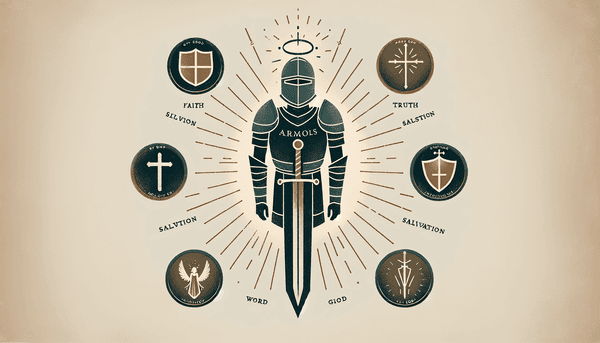Practical Christian Living and Justice
Christianity is not solely about understanding deep theological concepts but also about living out these principles in our daily lives. The call to 'act justly and to love mercy and to walk humbly with your God' (Micah 6:8) is as relevant today as it was in the days of the prophets. Husbands are encouraged to emulate the love of Christ for the church in their relationships with their wives (Ephesians 5:25, 33), fostering a loving and sacrificial bond. The New Testament continues to guide us towards unity and peace within the community, urging us to be patient, humble, and diligent in preserving the unity of the Spirit (Ephesians 4:2-3). Moreover, the wisdom literature of the Old Testament, such as Proverbs, calls us to be advocates for those who cannot defend themselves, speaking up for justice and the oppressed (Proverbs 31:8).
The Role of External Symbols in Faith
Symbols play a significant role in the expression of our faith, serving as visual and tangible reminders of spiritual truths. The cross, often worn as a necklace, is not merely a piece of jewelry but a profound symbol of Christ's sacrifice for humanity. It serves as a testament to his suffering and a prompt for reflection upon our own spiritual journey. Additionally, such symbols can open doors for sharing one's faith, providing an opportunity for believers to 'knock and the door shall be opened' in conversations about the Word. Scriptures such as 1 Corinthians 1:18 and Galatians 6:14 remind us of the importance and transformative power of the cross, while Matthew 16:24 calls us to take up our cross and follow Christ, reflecting both a personal and communal commitment to living out the gospel. To further explore the Christian ideals and symbolism, such as the powerful symbolism of the Lamb's blood in Christian redemption, continue reading our in-depth discussion.
Understanding Forgiveness and Rejecting Revenge
The Christian ethos places great emphasis on forgiveness, often challenging our natural inclinations towards revenge. Romans teaches us to 'never avenge yourselves, but leave it to the wrath of God' (Romans 12:19), trusting in the divine justice that surpasses our understanding. Following Christ's example, as seen in Matthew 5:38-48, believers are called to forgive and love their enemies, extending grace even in the face of wrongdoing. This spirit of reconciliation is further echoed in the New Testament, where Paul speaks of the ministry of reconciliation that has been entrusted to us by God (2 Corinthians 5:18-19), signifying a profound responsibility to mend relationships and foster peace.






